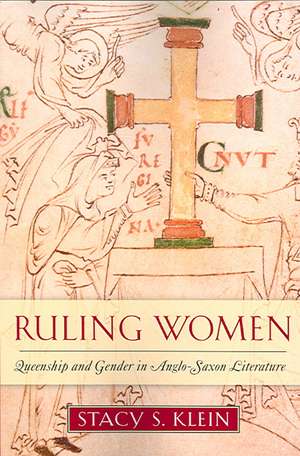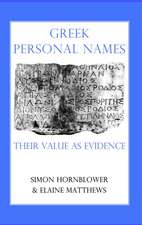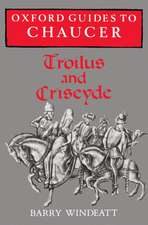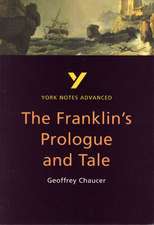Ruling Women – Queenship and Gender in Anglo–Saxon Literature
Autor Stacy S. Kleinen Limba Engleză Paperback – 29 apr 2006
| Toate formatele și edițiile | Preț | Express |
|---|---|---|
| Paperback (1) | 219.64 lei 43-57 zile | |
| MR – University of Notre Dame Press – 29 apr 2006 | 219.64 lei 43-57 zile | |
| Hardback (1) | 592.07 lei 43-57 zile | |
| MR – University of Notre Dame Press – 29 sep 2022 | 592.07 lei 43-57 zile |
Preț: 219.64 lei
Nou
Puncte Express: 329
Preț estimativ în valută:
42.03€ • 43.99$ • 34.98£
42.03€ • 43.99$ • 34.98£
Carte tipărită la comandă
Livrare economică 31 martie-14 aprilie
Preluare comenzi: 021 569.72.76
Specificații
ISBN-13: 9780268033101
ISBN-10: 0268033102
Pagini: 296
Dimensiuni: 152 x 228 x 23 mm
Greutate: 0.48 kg
Ediția:1
Editura: MR – University of Notre Dame Press
ISBN-10: 0268033102
Pagini: 296
Dimensiuni: 152 x 228 x 23 mm
Greutate: 0.48 kg
Ediția:1
Editura: MR – University of Notre Dame Press
Recenzii
"Perhaps the very fact that Ruling Women yields few generalizable results about queenship or gender, then, is its most important message. Such notions are historically and culturally specific, and they ought to be considered afresh for each text and writer, in the way Stacy S. Klein exemplifies with such skill." —TLS
"Klein shows how Anglo-Saxon writers used queens figuratively to comment on social and cultural issues of their times. Much of her discussion is on the political situations that underlie the portrayals of queens, including social hierarchy, the Benedictine Reform, and conversion. Chapters focus on works by Bede, the Beowulf poet, Cynewulf, and Aelfric. Although these works are not typically presented together, Klein unites them to illustrate the myriad roles of literary queens. . . An important contribution to Anglo-Saxon feminist theory, this book will have a significant impact on Anglo-Saxon studies in general." —Choice
"Stacy Klein demonstrates how representations of queens played integral roles in issues that are now recognized as crucial to Anglo-Saxon literature and culture, including 'conversion, social hierarchy, heroism, counsel, idolatry, and lay spirituality.' . . . Klein's integration of gender studies with more traditional forms of scholarship and her commitment to challenging traditional readings yield rewarding and provocative new insights into the constitutive role of queens in Anglo-Saxon literature." —Arthuriana
“Klein's work supplies a refreshing breath of air for those studying and teaching Old English literature, providing a discussion which steers an easy course between complex theoretical discussion (of which there is some) and careful reading of texts (of which there is much).” —Medium Aevum
Notă biografică
Stacy S. Klein is associate professor of English at Rutgers University. She is the author of numerous scholarly articles on Old English poetry, early medieval biblical translation, and Anglo-Saxon femininity.
Descriere
In Ruling Women, Stacy S. Klein explores how queens functioned as imaginative figures in Anglo-Saxon texts. Focusing on pre-Conquest works ranging from Bede to Ælfric, Klein argues that Anglo-Saxon writers drew upon accounts of legendary royal wives to construct cultural ideals of queenship during a time when that institution was undergoing profound change.
Also a study of gender, her book examines how Anglo-Saxon writers used women of the highest social rank to forge broader cultural ideals of femininity, even as they used female voices to articulate far less comfortable social truths. Capitalizing on queens’ strong associations with intercession, Anglo-Saxon writers consistently looked to royal women as mediatory figures for negotiating sustained tensions, and sometimes overt antagonisms, among different peoples, institutions, and systems of belief. Yet as authors appropriated legendary queens and inserted them into contemporary Anglo-Saxon culture, these royal “peaceweavers” simultaneously threatened to destroy existing unities and to expose the fragility of seemingly entrenched social formations.
Drawing on the strengths of historical, typological, and literary criticism, feminist theory, and cultural studies, Ruling Women offers us a way to understand Anglo-Saxon texts as both literary monuments and historical documents, and thus to illuminate the ideological fissures and cultural stakes of Anglo-Saxon literary practice.
"Legendary royal wives glitter here and there in the Anglo-Saxon corpus, from Bede's History to Beowulf and from Cynewulf's Elene to Aelfric's tales of Jezebel and Esther. Stacy Klein's book shows how writers mobilized these queens to address, indirectly, contemporary issues such as the downside of heroism or the upside of lay spirituality. This is a rich, learned, eloquent, and often surprising study." —Roberta Frank, Douglas Tracy Smith Professor of English, Yale University
"Ruling Women makes important contributions to current academic debates in many areas, among them historiography, queenship, sanctity, gender and identity, Ælfric and his age, Bede's Historia Ecclesiastica, and the Anglo-Saxon sense of the past. By bringing these varied discourses together in one book, carefully reconstructing the cultural, theoretical, literary and historical contexts in which Anglo-Saxon texts were made and read, Klein achieves a complex depth of vision that is enlightening, imaginative, innovative and exemplary. " —R. M. Liuzza, University of Tennessee, Knoxville

















